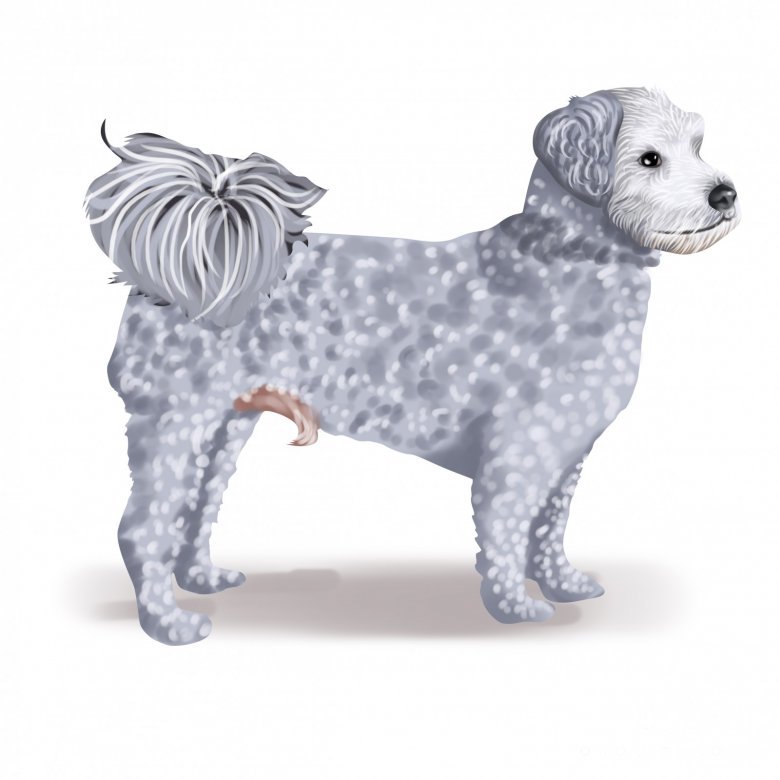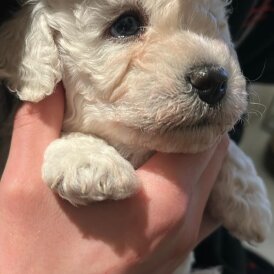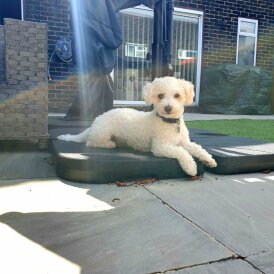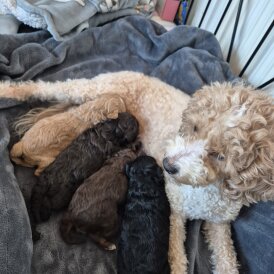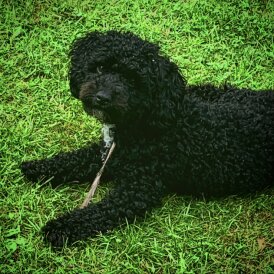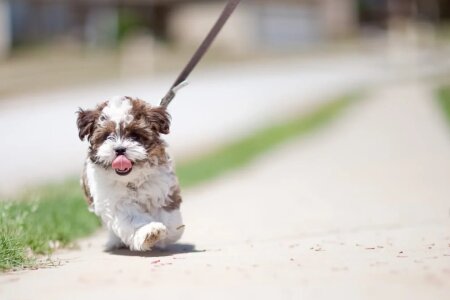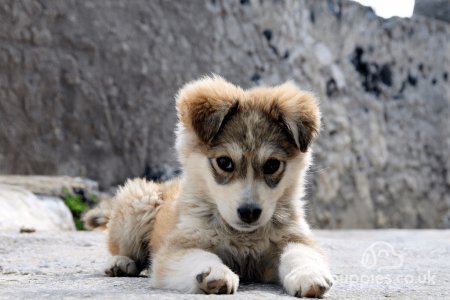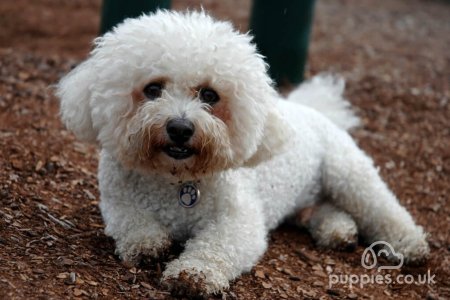Poochon (Bichpoo, Toy Poodle x Bichon Frise)
Overview
Incredibly cute and affectionate, the little Poochon makes for a wonderful companion pet for just about any owner, including first-time owners. As a mix between a Bichon Frise and either a Miniature or Toy Poodle, the cutely-named Poochon showcases many of the best traits of either or both parents.
These little hybrid breed dogs have only been around since the 1990s but have since warmed their way into the hearts of many loving owners in the UK and abroad.
Physical Appearance
On the one hand, it’s easy to distinguish a Poochon due to their striking similarities to the Bichon Frise and Poodle. On the other hand, distinguishing amongst Poochons can be fairly challenging since there is so much variance in their appearance due to their being a first-generation mixed designer breed.
Generally, Poochons are small-sized dogs with cute little black or brown noses, giving them a teddy bear-like appearance. Their eyes exude intelligence and curiosity, along with a touch of playfulness and even temperament.
Their tails can be fairly short and may look frayed at the tips, giving a bloom-like aesthetic. Their short coats are soft and curly, much like a Poodle’s, don’t shed, and are known to be hypoallergenic. Coat colours include white, black, apricot, and blue.
How big do Poochon dogs get?
Height: 22-35 cm
Weight: 2-8 kg
Character Traits
You would be correct if you assumed that the Poochon’s lively and cute appearance match their playful and affectionate temperament. They are just what you’d expect, showing a temperament quite similar in many ways to both parents, the Bichon Frise and Poodle.
Consequently, this breed is highly intelligent, energetic, playful, loyal, and can be trained quite easily. No-fuss, no hassle, just an exciting little companion to have around the home.
Sometimes, Poochons can develop ‘small dog syndrome’ whereby they are easily stressed out and behave irrationally, perhaps leading to excessive barking, nipping, or just generally naughty behaviour. Moreover, they can show some signs of stubbornness if they feel that they are in control. This can be corrected with proper discipline and training.
Are Poochon dogs intelligent? Yes.
Are Poochon dogs affectionate? Yes, very.
Do Poochon dogs have high or low energy levels? High energy.
Are Poochon dogs loyal? Yes.
Are Poochon dogs playful? Yes, very.
Are Poochon dogs aggressive? No.
Are Poochon dogs easy to train? Yes.
Are Poochon dogs good guard dogs? No, they are too friendly to be watchdogs or guard dogs.
Ability to Socialise
One great benefit of Poochons is that they’re highly social as a breed and tend to get along just fine with owners, families, and other pets including cats and dogs. Even strangers shouldn’t have anything to worry about, since Poochons can be quite sociable around strangers, especially once they’ve gotten accustomed to their presence, i.e. a frequent visitor or guest.
Of course, this makes them terrible guard dogs, but that shouldn’t be a reason to consider purchasing or adopting a Poochon in the first place. This breed is suitable as a home companion pet and is not supposed to be used as a working dog, hunting dog, and especially not as a guard dog.
As puppies, be sure to socialise your Poochon well and gradually. Introduce them to other pets and family members and make sure that they are disciplined for any boisterous behaviour, otherwise, they may think they can get away with naughty behaviour in the future.
Do Poochon dogs get along with other pets? Yes.
Do Poochon dogs get along with other dogs? Yes.
Are Poochon dogs good with kids? Yes.
Are Poochon dogs good with strangers? Yes, they are very sociable around strangers.
Lifestyle Suitability
As a small designer breed originally bred as companion pets, Poochons are perfectly suited for just about all types of living conditions and with just about any kind of owner. If you lead a sedentary lifestyle, are retired and remain at home quite a bit, and/or want a dog that is easy to maintain and will remain perfectly happy nestled by your side whilst you work on the computer, Poochons are just the right fit.
Although most dog breeds prefer large, rural environments with fields and gardens to claim as their own territory, Poochons can adapt just fine to an apartment or urban setting with limited green space. Nevertheless, some outdoor playtime and exercise are required to keep them healthy and happy.
Are Poochon dogs good for first-time owners? Somewhat. Proper training is required.
Are Poochon dogs hypoallergenic? Yes.
Are Poochon dogs prone to drooling? Not at all.
Are Poochon dogs a good breed for apartment living? Absolutely.
Do Poochon dogs shed a lot? Hardly any shedding at all.
Do Poochon dogs bark a lot? Yes, they tend to bark frequently.
Can Poochon dogs be left alone at home? No, do not leave them alone at all, if possible.
Can Poochon dogs handle the heat? Yes, but not too hot.
Can Poochon dogs handle cold temperatures? Somewhat.
Are Poochon dogs sensitive to loud noises? Yes.
General Health & Health Issues
The Poochon is about average in terms of health rankings, suffering from some fairly common health problems which are hereditary and some which are developed as they age. As both of their parents are purebreds, the Poochon may inherit excellent health from his parents but may also inherit some of their common health problems, too.
Owners should endeavour to have their Poochon brought into the veterinarian’s clinic frequently to diagnose and treat any possible health problems before they potentially get worse.
Some common problems include:
Patellar luxation: between the femur and the knee, the patella can be displaced and cause pain or discomfort to your Poochon;
Allergies: as with many designer breeds, allergies and subsequent allergic reactions can be common for your Poochon. As allergies can be triggered from so many different sources, it’s best to speak with your veterinarian to diagnose and treat the allergies;
Retinal dysplasia: a degenerative process of the photoreceptor cells, retinal dysplasia can lead to nightblindness or full blindness of your Poochon. Have him inspected frequently at the veterinarian’s clinic;
Bladder stones: commonly diagnosed by either blood in the urine, or strained urine, bladder stones can be quite painful. Fortunately, there are three treatment methods available, two of them being non-surgical.
How long do Poochon dogs live? - 12-15 years
Exercise & Play Time
Poochons require practically no exercise at all. Just half an hour or so per day is all that’s needed to keep them tired and happy. As puppies, try not to overexercise them and be ready to pick them up to walk them home if they’ve pooped out their little legs and just can’t walk anymore.
It’s recommended that you walk your Poochon outdoors and preferably off-lead, but only where it is safe to do so. In public spaces, keep them on their lead so they don’t end up chasing everything that runs or flies by them.
Around water, Poochons are known to be quite avid swimmers. Keep a close eye on them and dry them off sufficiently after they’ve gone in for a dip to prevent infections from setting into their short, curly coats.
How much exercise does a Poochon dog need? - About 30 minutes per day
Do Poochon dogs like water play? Yes, just keep an eye on them whilst swimming.
Nutrition & Feeding
As a small designer dog, Poochons eat relatively little. Since they don’t consume as much food as most other large breeds, try to ensure that their diet is healthy and promotes excellent development with rich vitamins, nutrients, and minerals.
Cold-pressed and raw food diets can be excellent alternatives for many breeds, including Poochons, but please speak with your veterinarian to ensure that any alternative diets are in accordance with the breeder’s feeding schedule and that it works for your Poochon’s health.
Are Poochon dogs prone to weight gain? Yes, especially as they age.
How much should I feed a Poochon puppy? About 40-165g per day, in 2-3 sessions.
How much should I feed an adult Poochon dog? About 55-130g per day, in total.
Care & Maintenance
Grooming your Poochon should be fairly easy and hassle-free. Occasional brushing a few times a week ought to keep their coat’s lustre and fluffy appeal in top shape. A few times per year, professional grooming is recommended to have their nails trimmed and to be clipped.
Emotionally, Poochons are highly dependent upon companionship. They must always have someone around to entertain (or to be entertained) and are thus not ideal if you cannot commit to meeting their emotional needs.
- Grooming: 2-3 times per week, brush your Poochon’s soft coat and remove any tangles and keep the coat free of debris. Also inspect their ears, eyes, whiskers, and beard (they tend to get a little messy when eating).
- Emotional care: always have someone home to accompany your Poochon. They do not tolerate loneliness well at all, even for short periods.
History of the Poochon
As with many designer dogs, the Poochon’s history is neither very deep nor very well documented, either. It has been established, however, that the cute little Poochon was originally bred in Australia in the early 90s at a time when designer crossbreeds were beginning in earnest.
The original goal was to achieve the best characteristics of both the Bichon Frise and the Miniature (sometimes Toy) Poodle, and since the breed is a mix of two purebreds he is considered a first-generation mixed breed.
Since the early 2000s, the Poochon has become incredibly popular as a breed in the UK and elsewhere, but still has no major formal recognition from international kennel clubs or associations such as the Kennel Club or Federation Cynologique Internationale.
Interesting Facts About Poochon Dogs
Historically, it may be likely that Poochons were bred before the 1990s before formal breeding programmes took form;
As a first-generation mixed breed, there is little to no uniformity in Poochon breeding, so each puppy can be quite unique from another;
Unfortunately, many Poochons have been put up for adoption, so if possible, please adopt yours.
Getting a Poochon Puppy
With so many Poochons being put up for adoption, we highly recommend you consider adopting and consult our buying guide. Should you decide that you’d like to purchase a Poochon, make sure that your Poochon has been bred in ethical circumstances from reliable sellers rather than a puppy mill.
How much does a Poochon cost to buy? - About £300-£500.
How much does a Poochon cost to feed? - An adult Poochon costs about £0.70-£1.00 per day to feed.
How much does insurance for a Poochon cost? - About £25-£50 per month.
Sensible alternatives to purchasing a new Poochon puppy include rescue and adoption.
Additional resources can be found via Poochon registries and associations such as:






